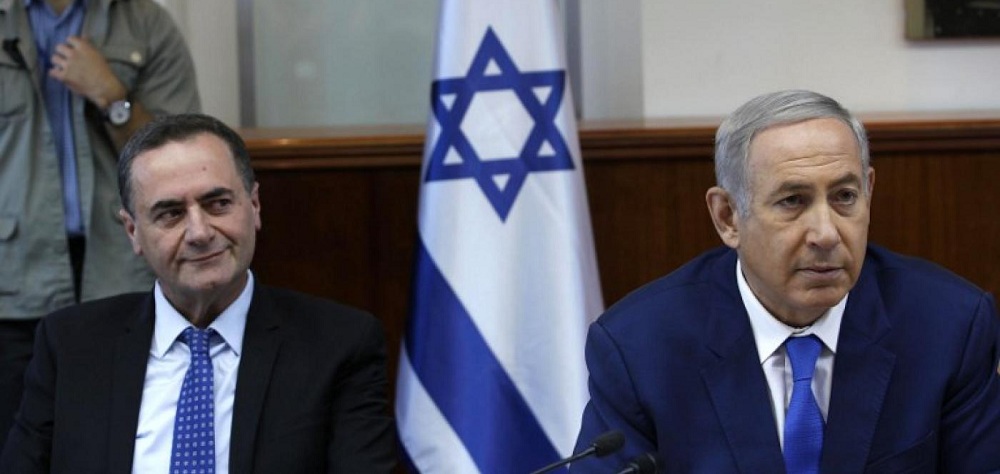Alwaght- Recently, Israeli Foreign Minister Yisrael Katz has brazenly threatened Iran with military action saying that the regime is ready to bomb the Iranian nuclear facilities. The threat against Iran comes as over the past years the Israeli politicians from a variety of parties expressed concerns about Iran's peaceful nuclear program and threatened that military action is still on the table. But should their threats be taken seriously? Is Tel Aviv, as it boasts, ready to attack Iran? What are the drives behind these largely propagandistic words?
Big bluff amid serious home and regional troubles
The Israeli leaders talk about the readiness to combat the increasingly developing Iran-led Axis of Resistance while with a glance at the Israeli status at home and abroad we can observe the resounding challenges Tel Aviv is grappling with. The difficult situation the Israeli regime is living reveals the fact that Tel Aviv at the time being seeks to steer clear of any big war more than any other time in its 70-year history.
Internally, serious economic woes and extremely fragile security conditions encourage everlasting reverse migration waves from the occupied territories. Moreover, the occupying regime is faced with a political limbo that results in a failure to form a new cabinet caused by deep differences among the various Israeli political parties. The regime held two parliamentary elections within six months and its leaders, mainly Katz and Netanyahu who lead two major parties, are still at loggerheads about announcing a new early election as they still disagree on which of them should lead a new cabinet.
Regionally, the Israeli security is becoming increasingly vulnerable as the regime is cordoned off by a powerful Resistance camp from Lebanon, Syria, and Gaza. Tel Aviv, many experts agree, cannot even repeat the same big wars it waged against Lebanon and Gaza Strip in the past as Hezbollah and Hamas have remarkably increased their deterrence power and the capability to strike back. Lebanon and Gaza are now homes to huge missile bases with missiles locked on the depth of the occupied Palestinian territories. The Israelis have not made anything remarkable in the face of the new realities but accepting them.
When in 2015, Gadi Eizenkot, the chief of general staff of the Israeli military, officially published the army's new strategy, he noted that in any new war in the future, the Israelis have to fight on several fronts. This idea has been circulating in the Israeli military and political circles over the past four years. The Israelis designed their military’s function and drills in line with this doctrine. From avoiding a big war in the southern front (with Gaza) and launching spot attacks in Syria and uniting the northern front (from the occupied Golan Heights to southern Lebanon borders) to constant war simulations on various fronts and launching Operation Northern Shield on the border with Lebanon to destroy the alleged Hezbollah tunnels into the occupied territories all are driven by the multi-fronted war hypothesis. So, the Israeli minister’s anti-Iranian threat serves an agenda rather than a real adventure against Iran.
Running anti-Tehran media propaganda along with European pressures
One main reason the Israelis have ramped up their threats with military action against Iran is unleashing media propaganda against Tehran amid recent European criticism against the Iranian missile program. Over the weekend, Britain, Germany, and France in a move largely seen as blameshifting and an escape forward from their commitments to Iran nuclear program wrote a letter to the United Nations chief blasting Iranian conventional and defensive missiles program. The step, enthusiastically welcomed by the Israeli leaders, failed to get the world support due to a record of treachery showed by the Western powers towards the Iranian nuclear deal. Israelis want to keep the Iranian missile program a global media headline using propaganda coordinated with the West.
Promoting Iranophobia and pursuing security agreement with Arab states
Moreover, the new round of anti-Iranian threats comes amid show of interest by Persian Gulf Arab states to start a dialogue with Tehran with the basis being the Iran-proposed Hormuz Peace Endeavor (HOPE). The Israelis, like their American allies struggling to block the way of any Iranian-Arab closeness, along with Iran’s HOPE initiative unveiled their own initiative that called on the Arab monarchies of the Persian Gulf to move to talks and sign a security agreement with Tel Aviv. The invitation failed to catch the Arab welcome. But, on the other side, the US administration is taking serious steps to force the Arab leaders to sign a treaty with the Israeli regime. Last week, the US administration pushed to advance a non-aggression agreement with four Arab countries that do not currently have diplomatic relations with Israel. These countries are Oman, the United Arab Emirates, Bahrain, and Morocco. American sources state that US Deputy National Security Advisor Victoria Coates met with the ambassadors of the UAE, Bahrain, Oman, and Morocco in Washington, where she explained the new Israeli initiative and asked for their response.
Iranophobia should be, apparently, seen as a flavor to this scenario, as Washington for years used this strategy to sell arms to the oil-wealthy Arab states. The Israeli FM has recently used the same strategy with the Arabs to bring them beside Tel Aviv in a common camp. He said: “If Iran crosses the 'red line', it will discover a uniform front between Saudi Arabia, UAE and the United States, which will launch hundreds of Tomahawk missiles at Tehran.”
But the Israelis are very well aware that such a “foolishness”, as the Iranian officials say, will be met with an unimaginable reaction by Tehran. So, Tel Aviv’s ostensibly remarks of power are driven by big and constant fear and frustration haunting the occupying regime.



























